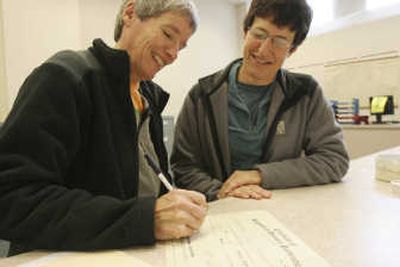Oregon becomes ninth state to register domestic partners

PORTLAND – Couples exchanged rings, toasted each other and broke into cheers Monday as other same-sex pairs emerged from the red brick Multnomah County Building waving certificates declaring them newly registered domestic partners.
It was the first day of registration in Oregon after U.S. District Judge Michael Mosman lifted a temporary injunction imposed pending resolution of an argument over petition signatures.
The ruling on Friday made Oregon the ninth state to approve spousal rights in some form for same-sex couples.
Couples who pay the $60 registration fee can now file joint state tax returns, inherit each other’s property and make medical choices on each other’s behalf, among other benefits married Oregonians have.
“Champagne – ya gotta do it,” said Tiffany Isaman, as she and her partner of four years, Clair Shannon, toasted each other and exchanged rings outside the county building on Monday.
“There aren’t words to describe how I feel. I’m floating,” Isaman added.
For Berdell and Casey Moffett-Chaney, it was the fifth try during 25 years together.
The Moffett-Chaneys said the first was a holy union ceremony, then a domestic partnership, a marriage in Portland that was later voided by the courts, a still-valid marriage in Canada and Monday’s domestic partnership.
The line of early applicants flowed out the door. Volunteers passed platters of chocolate cupcakes.
“My 8-month-old daughter is proud to have two legal mommies,” read a placard held aloft by one woman on a nearby corner.
In 2004, Multnomah County passed a law authorizing same-sex marriages and about 3,000 couples took advantage. The law later was ruled unconstitutional and the marriages voided. Voters passed a state constitutional ban on gay marriages that year.
Opponents of the domestic partnership law passed by the 2007 Legislature have argued, among other things, that it disregarded the will of Oregon voters who passed the ban on same-sex marriage.
An Arizona-based group that advocates for Christian legal issues had gone to federal court to argue that county elections clerks had improperly disqualified voter signatures collected during a drive to refer the domestic partnership law to the November 2008 ballot.
But Mosman rejected arguments by the Alliance Defense Fund that state elections officials should have made more of an effort to contact voters whose signatures were disqualified. The referendum drive fell 96 signatures short of the 55,179 needed to refer a law passed by the legislature to the ballot.
The Alliance Defense Fund has said it plans to appeal Mosman’s ruling.
On Monday, Wayland Bruns and Brad Townsend, who married three years ago in Vancouver, B.C., were in snappy coats and ties, standing out from the more casual majority.
Bruns said he could forsee a time when gay marriage might again be authorized in Oregon, “but it will take more Democrats being elected.”
He was cautious about their new status, saying with many Republicans still opposed, “nothing is safe.”
Several couples said they hope for eventual federal recognition that will allow them other rights such as sharing Social Security benefits.
In Salem, Martha Aaron came bearing a red rose and a cup of coffee brought for her by partner Katie Howe.
“The more people take this legal step, the more friends, families and co-workers will know what is real in our lives, and how having legal protections is just what’s fair,” she said.
“It doesn’t take away from anyone else’s legal protections for us to have this,” Howe added.
Both carry wallet-sized photographs of their daughter, now 11.
Carrie and Sheila Parkins, of Keizer, said they are planning a formal commitment ceremony to celebrate their new status.
“To me, this is not any different than marriage,” said Carrie Parkins. “As long as we are getting the benefits, it doesn’t matter what it is called.”
“We have children, and we want to make sure we can make decisions for them,” Sheila Parkins chimed in, before the two left the clerk’s office with their certificate of domestic partnership, arms around each other’s waists.
Marion County Clerk Bill Burgess said he might be facing a tough re-election campaign in November, after his office disqualified some signatures on petitions to refer the domestic partnership law to the November 2008 ballot.
“But we have to treat every person with dignity and apply the law fairly,” Burgess said. “I am happy the court’s decision vindicated what county clerk’s offices were doing around the state.”